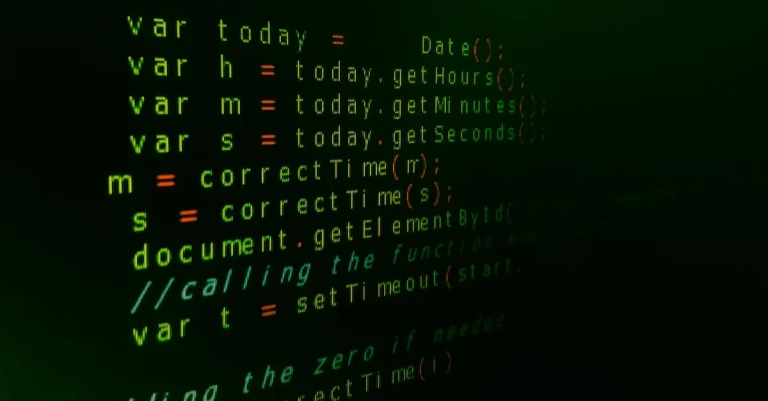Is Computer Science Hard For Beginners? Demystifying The Challenge
If you’re new to computer science, you may be worried about struggling with little to no coding experience. Computer science has a reputation for being intensely difficult and competitive. However, while parts of a CS education can be complex, success is certainly achievable for beginners with the right strategies.
The key is having patience, embracing practice, and leveraging available help when needed. With commitment to learning fundamental concepts first and gradually building skills, computer science is completely surmountable for newcomers.
This comprehensive guide will break down the perceived difficulties of computer science, outline strategies to help you thrive as a beginner, and prove that anyone can master CS fundamentals with dedicated effort.
Understanding Why Computer Science Seems Hard
Computer Science (CS) is often perceived as a challenging field for beginners. This perception can be attributed to several factors:
The Technical and Analytical Nature of CS
Computer Science is a discipline that involves technical and analytical thinking. It requires individuals to approach problems logically and systematically. The concepts and principles in CS can be complex and abstract, making it challenging for beginners to grasp initially.
However, with proper guidance and practice, anyone can overcome these challenges and become proficient in CS.
The Vastness of the Field and Required Knowledge
The field of Computer Science is vast and constantly evolving. It encompasses various subfields such as artificial intelligence, data science, cybersecurity, and software development, to name a few. This vastness can make it overwhelming for beginners to decide where to start and what specific areas to focus on.
Additionally, CS requires a solid foundation in mathematics and logical reasoning, which may be unfamiliar to some individuals. However, breaking down the field into smaller, manageable parts and gradually building knowledge and skills can make the learning process more approachable.
The Need to Learn Programming Languages
One of the fundamental aspects of Computer Science is programming. Learning programming languages can be challenging for beginners, as it involves understanding syntax, logic, and problem-solving techniques.
However, once the basics are mastered, programming becomes a powerful tool for implementing ideas and solving real-world problems. There are numerous resources available online, such as interactive coding platforms and tutorials, that can assist beginners in learning programming languages at their own pace.
Developing a Growth Mindset
When it comes to learning computer science, one of the most important factors for success is developing a growth mindset. This mindset is characterized by the belief that intelligence and abilities can be developed through dedication and effort.
It is the understanding that challenges and mistakes are an essential part of the learning process.
Making Mistakes is Part of the Learning Process
In computer science, making mistakes is not only common but also necessary for growth. It is through making mistakes that beginners can identify areas where they need to improve and learn from them. Embracing mistakes allows individuals to analyze their errors, understand the underlying concepts, and find alternative solutions.
As the saying goes, “Failures are stepping stones to success.” So, don’t be discouraged by mistakes; instead, view them as opportunities to learn and grow.
Intelligence Can Be Developed Through Practice
Contrary to popular belief, intelligence is not fixed but can be developed through practice. This means that even if someone initially struggles with computer science, they can gradually improve their skills and understanding through consistent effort.
Just like learning any other subject, computer science requires time and dedication. With each practice session, beginners can enhance their problem-solving abilities, logical thinking, and programming skills.
So, don’t be intimidated by the initial challenges; with persistence, anyone can succeed in computer science.
Challenges Help Strengthen Critical Thinking
Computer science is known for its complex problem-solving nature, which in turn helps strengthen critical thinking skills. When faced with challenging programming problems, beginners are required to analyze the problem, break it down into smaller manageable parts, and come up with creative solutions.
This process enhances their ability to think critically, identify patterns, and develop innovative approaches. By embracing challenges, beginners can sharpen their problem-solving skills, which are not only valuable in computer science but also in various other aspects of life.
Developing a growth mindset is crucial for beginners in computer science. By understanding that making mistakes is part of the learning process, that intelligence can be developed through practice, and that challenges help strengthen critical thinking, individuals can overcome the initial difficulties and thrive in the field.
So, don’t let the perceived difficulty deter you from pursuing computer science – instead, embrace the challenge and watch yourself grow and excel.
Mastering Computer Science Building Blocks
Computer science can seem daunting to beginners, but with the right approach, anyone can master the fundamentals. One of the key building blocks in computer science is understanding data structures. These are the ways in which data is organized and stored in a computer’s memory.
By starting with the fundamentals of data structures, beginners can gain a solid foundation that will serve them well as they progress in their computer science journey.
Start with Fundamentals Like Data Structures
Data structures are like the building blocks of computer science. They are the foundation upon which more complex algorithms and programs are built. Understanding data structures, such as arrays, linked lists, stacks, and queues, is crucial for solving problems efficiently and optimizing code.
There are many online resources available that provide comprehensive explanations and examples of different data structures, making it easier for beginners to grasp these concepts.
GeeksforGeeks is one such website that offers a wide range of tutorials and articles on data structures. It covers everything from basic concepts to advanced topics, with code examples and visualizations to aid understanding.
By starting with the fundamentals of data structures, beginners can lay a strong foundation for their computer science journey.
Practice Critical Thinking and Problem Solving
Computer science is not just about memorizing code or syntax; it’s about developing critical thinking and problem-solving skills. To become proficient in computer science, beginners need to practice thinking analytically and breaking down complex problems into smaller, more manageable parts.
By honing these skills, beginners can become better equipped to tackle coding challenges and develop efficient and elegant solutions.
There are various resources available that offer coding exercises and challenges specifically designed to improve critical thinking and problem-solving skills. Websites like CodeWars and HackerRank provide a platform for beginners to practice their coding skills and compete with others.
These platforms offer a wide range of coding challenges across different difficulty levels, allowing beginners to gradually progress and improve their problem-solving abilities.
Work Through Coding Exercises and Projects
One of the most effective ways to learn computer science is through hands-on practice. By actively working through coding exercises and projects, beginners can reinforce their understanding of concepts and gain valuable experience in implementing code.
This practical approach not only helps solidify knowledge but also fosters creativity and innovation.
There are numerous online platforms and resources that offer coding exercises and projects for beginners. Websites like freeCodeCamp and Codecademy provide interactive coding tutorials and projects that cover a wide range of topics, from web development to data analysis.
By working through these exercises and projects, beginners can apply their knowledge in real-world scenarios and build a portfolio of practical coding experience.
Mastering computer science building blocks requires a combination of understanding fundamental concepts, practicing critical thinking and problem-solving, and actively working on coding exercises and projects.
With dedication, persistence, and the right resources, beginners can overcome the challenges and unlock the vast potential of computer science.
Leveraging Available Resources and Support
When it comes to learning computer science, leveraging available resources and support can greatly enhance your understanding and mastery of the subject. Here are some effective ways to make the learning process smoother and less daunting:
Join Study Groups with Fellow Students
One of the best ways to navigate the challenges of computer science as a beginner is to join study groups with fellow students. Collaborating with others who are also learning the subject allows you to share knowledge, exchange ideas, and solve problems together.
Not only does this foster a sense of camaraderie, but it also provides an opportunity to learn from different perspectives and approaches. Additionally, when you face difficulties, you can seek help from your study group members, who may have encountered similar obstacles and can offer valuable insights.
Attend Professor and TA Office Hours
Another crucial resource that beginners should take advantage of is the availability of professors and teaching assistants during their office hours. These designated times allow students to seek one-on-one guidance from the experts in the field.
Whether you are struggling to understand a concept, need help with a programming assignment, or simply want to deepen your understanding, attending office hours can be immensely beneficial. By asking questions and engaging in meaningful discussions, you can clarify doubts, gain additional insights, and receive personalized guidance tailored to your specific needs.
Use Online Tutorials, Courses, and Forums
The internet is a treasure trove of resources for learning computer science. Online tutorials, courses, and forums offer a wealth of information and support that can supplement your classroom learning.
Websites like Codecademy, Udemy, and Stack Overflow provide comprehensive tutorials, interactive coding exercises, and a platform to seek help from the programming community. These online resources not only offer flexibility in terms of pace and schedule but also provide opportunities to connect with fellow learners and experienced professionals.
By leveraging these platforms, you can gain practical skills, stay updated with the latest trends, and find solutions to the challenges you encounter along the way.
By utilizing these available resources and support systems, beginners can overcome the perceived difficulty of computer science and embark on a successful learning journey. Remember, the key lies in being proactive, seeking help when needed, and embracing the wealth of knowledge that is readily accessible.
Developing Effective Study Habits
When it comes to learning computer science, developing effective study habits is crucial for beginners. With the right approach, anyone can overcome the challenges and excel in this field. Here are some tips to help you develop effective study habits:
Dedicate Consistent Time to Study
Consistency is key when it comes to studying computer science. It’s important to set aside dedicated time each day or week to focus on learning and practicing the concepts. By creating a routine, you can train your brain to be more receptive to the material and build a solid foundation.
Additionally, it’s important to find a study environment that works best for you. Some people prefer a quiet space, while others thrive in a more lively setting. Experiment with different study environments to find the one that helps you focus and retain information effectively.
Create a Strategic Study Plan
Having a well-structured study plan can make a significant difference in your learning journey. Start by breaking down the topics you need to cover into smaller, manageable chunks. This will help you organize your study sessions and prevent overwhelm.
Set specific goals for each study session and track your progress. Consider using a planner or digital tools to keep yourself accountable and motivated. By having a clear plan, you can stay on track and ensure that you’re covering all the necessary material.
Take Good Notes and Stay Organized
Taking effective notes is essential in computer science as it involves complex concepts and algorithms. Be an active listener during lectures or online tutorials and jot down key points, examples, and explanations. Use different colors or highlighters to differentiate important information.
Organize your notes in a way that makes sense to you. Consider using digital note-taking tools or creating a physical binder for your computer science materials. Being able to easily access and review your notes will help reinforce your understanding of the subject.
Furthermore, it’s important to stay organized not just with your notes, but also with your assignments and projects. Keep track of deadlines, create a to-do list, and break down tasks into manageable steps. This will help you stay on top of your work and reduce stress.
Remember, developing effective study habits is a process that takes time and effort. Stay motivated, be consistent, and don’t hesitate to seek help from online resources, forums, or your peers. With the right mindset and study habits, you can conquer the challenges of learning computer science as a beginner.
Conclusion
While parts of computer science can be complex for beginners, the key is having patience with yourself, embracing hands-on practice, and using available help like study groups, office hours and online resources.
With dedication to learning fundamental building blocks first and developing an effective study plan, computer science is absolutely conquerable for newcomers.







